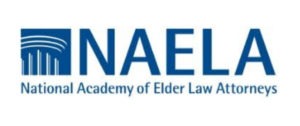Do you or a loved one have a disability and need to plan for your future?
 The National Academy of Elder Law Attorneys (“NAELA”) has designated October as National Special Needs Law Month. NAELA wanted to spotlight special needs law to help spread the word to people with disabilities and their families that there are attorneys who specifically focus on helping them with a wide variety of legal needs, including becoming qualified for government benefits.
The National Academy of Elder Law Attorneys (“NAELA”) has designated October as National Special Needs Law Month. NAELA wanted to spotlight special needs law to help spread the word to people with disabilities and their families that there are attorneys who specifically focus on helping them with a wide variety of legal needs, including becoming qualified for government benefits.
For needs based government benefits programs such as Medicaid or SSI, the applicant must satisfy income and asset restrictions. One way a special needs lawyer can help an applicant meet the restrictions for the assets test is to create a special needs trust. There are two types of special needs trusts. A special needs trust that is established using the money of the person who has a disability (1st party trust) or a special needs trust that is established by another person, with their money, for the benefit of the person with a disability (3rd party trust).
One of the important distinctions between a 1st party special needs trust and a 3rd party special needs trust is that a 1st party trust has a Medicaid payback provision and a 3rdparty trust does not. This distinction is crucial for family members who want to leave the person with a disability an inheritance to understand. (An inheritance can greatly enhance the quality of life for a person with a disability by making things such as additional therapies available, but an unplanned inheritance can potentially disrupt the quality of life by threatening the continued receipt of much needed government benefits). An attorney familiar with special needs law can assist the family members in planning ahead for inheritances by including the appropriate 3rd party special needs trust provisions in their estate plans.
Using special needs trusts in estate plans is just one example of the ways in which an attorney with knowledge of the special needs area of the law can help people with disabilities and their families. There are many other ways that an attorney with this knowledge can be of assistance in planning for the present and future wellbeing of the person with a disability.
SBEMP’s Special Needs & Elder Law practice group provides representation and advocacy for individuals and families with special needs due to disability or age, providing a broad range of services, including; but, not limited to the following:
- Special needs trusts (SNT)
- A First Party or Self-Settled (a.k.a., d(4)(A)) SNT is funded with the assets of the individual with special needs, which typically come from settlement funds derived from a medical malpractice or personal injury lawsuit or assets the individual with the disability has accumulated or inherited. The purpose of creating such an SNT is to preserve current and future eligibility for means-tested governmental programs for the individual with the disability.
- A Third Party SNT is funded with the assets of family and friends (a.k.a., third parties) for the benefit of an individual with special needs.
- Guardianships & Conservatorships
- A Guardianship or Conservatorship of the Person grants powers to the guardian over the incapacitated individual to make decisions regarding everyday matters such as medical care, residency and living arrangements, education, employment, and recreational activities.
- A Guardianship or Conservatorship of the Estate or Property grants powers to the guardian to exercise decision making with regard to the incapacitated individual’s finances.
- Trust, guardianship, and conservatorship accountings
- Access to federal and state disability based programs
- Medicaid planning
- Medicaid, Medicare, and private health insurance coverage
- Special Education

For more information or to request a consultation please contact the law offices of SBEMP (Slovak, Baron, Empey, Murphy & Pinkney) by clicking here.
SBEMP LLP is a full service law firm with attorney offices in Palm Springs (Palm Desert, Inland Empire, Rancho Mirage), CA; Indian Wells, CA; Costa Mesa (Orange County), CA; San Diego, CA; New Jersey, NJ; and New York, NY.
